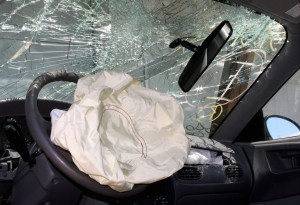
The Justice Department reached a $1 billion settlement with Takata due to its faulty airbags that resulted in the largest recall in U.S. history.
Takata Corp., the Japanese supplier whose airbags have been linked to at least 11 U.S. deaths, has agreed to plead guilty and pay fines and restitution totaling about $1 billion, the Department of Justice announced Friday afternoon.
Reflecting what U.S. Attorney General Loretta Lynch this week called an effort to hold “flesh-and-blood individuals,” rather than just “faceless corporations” responsible for criminal activity, three Takata executives have been indicted in the scandal. Takata acknowledged it not only produced defective airbags but took steps to conceal that information from both its automaker customers and from the public.
“Takata was supposed to be selling products that saved lives,” said Sandra Moser, principal deputy chief of the DOJ’s Fraud Section. Instead, for more than a decade … it put profits ahead of people’s safety.”
The settlement comes just days after the Justice Department reached a $4.3 billion deal with Volkswagen AG, which admitted it had illegally rigged 11 million diesel-powered vehicles – more than 500,000 of which were sold in the United States. Six senior level VW managers also were indicted, with Attorney General Lynch indicating others may yet be indicted. The U.S. Environmental Protection Agency also this week formally accused Fiat Chrysler Automobiles of cheating on diesel emissions.
In the case of Takata, a deal with the government had been widely expected. After initially being accused of stonewalling investigators, Takata executives last year agreed to fully cooperate with the government.
The case centers around faulty airbag inflators that were produced at two North American facilities. Researchers initially believed they were improperly manufactured and are vulnerable to malfunctioning when used in regions with high humidity and heat, such as Southern Florida.
But a research panel funded by the auto industry last year determined that even Takata airbags used in drier, cooler climates could deploy over-aggressively. The problem appears to be linked to the explosive ammonium nitrate used to power Takata’s airbags. It can begin to break down over time, National Highway Traffic Safety Administration data indicating up to 80% of the suspect bags can malfunction after a decade in operation.
The Japanese supplier has already paid more than $200 million in fines levied by NHTSA, the safety agency ordering a series of recalls covering tens of millions of vehicles. Worldwide, more than 42 million vehicles are involved in recalls ordered to replace Takata airbags.
The criminal case centers around evidence Takata had knowingly provided misleading test reports to users of its airbags, notably including Honda Motor Co., the supplier’s largest customer. The test results were ultimately deemed to provide “selective, incomplete or inaccurate data,” according to an earlier government report.
(Takata expected to pay $1B as part of faulty airbag settlement. For more, Click Here.)
The settlement includes a $25 million criminal penalty, while Takata will also pay $850 million in restitution to automakers who purchased its defective airbags. Another $125 million will go towards a compensation fund covering those injured or killed as a result of Takata airbags who have not already reached settlements with the supplier. Along with the 15 deaths – 11 in the U.S. – at least 184 people.
Kenneth Feinberg, a compensation expert who also oversaw the 9/11 victims’ fund and another fund set up to compensate those killed or injured due to faulty General Motors ignition switches, has been recommended to handle the Takata compensation. That will yet have to be approved by the court overseeing the Takata case.
Takata also will face three years of probation. A monitor will be appointed to oversee actions by the company, including its efforts to meet the terms of the criminal settlement.
“If there is one message we want to send today it is deterrence,” said Barbara McQuade, the U.S. Attorney for the Eastern District of Michigan, who oversaw the Takata case. “Cheaters will not be allowed to get ahead of those corporations who play by the rules.”
Government officials said they also wanted to send a message to individuals who might be willing to assist corporations cheat. Shinichi Tanaka, Hideo Nakajima and Tsuneo Chikaraishi are accused of concealing safety data that might have led automakers to stop using Takata airbags, said McQuade. All three are currently in Japan, but efforts will be made to bring them back to the U.S. for prosecution, she added.
According to FBI officials, the criminal settlement is the result of a 25-month investigation. The effort was aided by discovery of e-mails that documented Takata’s airbag problems, as well as the role of the three officials charged.
Even with the announced settlement, the Takata case is not closed. “Our investigation is ongoing,” said McQuade. “If we are able to identify other individuals, we will charge them, as well.” She added that the company, after initially hindering federal regulators, has been “very cooperative…in recent months.”
(Honda’s Takata problems continue with recall of 1.29 million vehicles. For more, Click Here.)
Meanwhile, the recall of vehicles using Takata airbags is expected to continue for several more years, in part, due to a lack of replacement parts.
On Friday, Toyota added 543,000 vehicles to its list of those facing recall due to faulty airbags. That came a day after Ford Motor Co., meanwhile, recalled more than 816,000 vehicles equipped with Takata airbags and just two days after the recall of another 1.29 million vehicles at Honda. That automaker Takata’s largest, has now had to announce repairs involving 11.4 million vehicles due to Takata.
All together, dozens of manufacturers have been impacted, from niche players like Ferrari to giants like General Motors and Toyota.
Declaring that the Takata settlement “was no surprise and was expected,” Peter Prieto, an attorney with Florida-based Podhurst Orseck, and the lead counsel in consumer legal action against Takata and the various automakers, said those lawsuits will move ahead. “The danger posed by Takata airbags, he said, “has been made catastrophically clear.”
The settlement of the Takata probe comes during a busy week for government authorities overseeing the auto industry. Volkswagen AG agreed to a $4.3 billion settlement linked to its rigging of diesel emissions tests. Meanwhile, the Environmental Protection Agency accused Fiat Chrysler Automobiles of rigging its own diesel engines.
Federal authorities had increased scrutiny of the auto industry under the Obama Administration. It remains to be seen how the incoming Trump Administration will handle such oversight, the president-elect declaring his interest in reducing government regulations. The FCA diesel probe will be one test of the new administration’s approach.
(Fiat Chrysler latest to be accused of rigging diesel emissions tests. Click Here for the story.)
For her part, however, U.S. Attorney McQuade said she does not expect to change her approach, stressing that, “We will continue to bring cases like this out of this office.”

